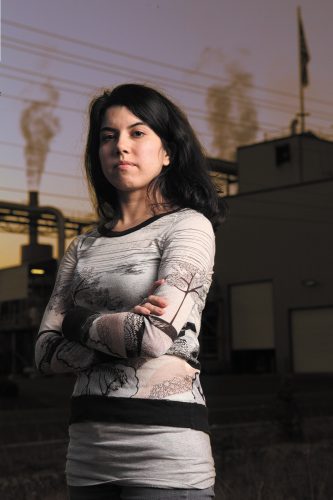
West Eugene residents exposed to high levels of toxic chemicals and air pollutants that affect their health will now have a more effective means of communicating concerns about air quality concerns. Beyond Toxics, a local nonprofit dedicated to protecting human and environmental health, resolved a civil rights complaint filed in 2014 with the U.S. Environmental Protection Agency (EPA).
The EPA found that Lane Regional Air Protection Agency (LRAPA) was discriminating against Latinx residents in an industrial neighborhood of west Eugene. The EPA called for direct action from LRAPA to improve air quality monitoring and community engagement of the west Eugene neighborhood.
“I’m elated and surprised that this complaint was followed through, especially under the administration we have today,” says Lisa Arkin, executive director of Beyond Toxics.
In a 17-page resolution letter, the EPA lists actions for LRAPA to take, including designating a non-discrimination coordinator, establishing a way for individuals to file complaints in languages other than English, providing individuals who are bilingual, engaging with the local community, working directly with Beyond Toxics to establish air quality monitoring sites and more.
The complaint was filed in August 2014 by Crag Law Center on behalf of Beyond Toxics. The EPA contacted LRAPA and notified the Springfield-based agency that it would accept part of the complaint under the Civil Rights Act of 1964.
Merlyn Hough, director of LRAPA, says his agency thought it had resolved the matter in September 2014 when it submitted a detailed response to the EPA. During this time period the EPA’s External Civil Rights Compliance Office became the Office of Civil Rights. LRAPA did not hear back from the EPA until late last year.
“[The] EPA contacted us last November to resolve this matter in a form agreeable to us and offered us assistance we thought would be most useful and helpful. Our goal was to accept that as an opportunity and to be a model in all those aspects compared to the other agencies,” Hough says.
LRAPA will not be hiring a new non-discrimination coordinator, but has identified two individuals in its task force, Jo Niehaus and Katie Eagleson, who speak Spanish and would step in to fill the new role.
The EPA’s letter of resolution also calls for LRAPA to work with Beyond Toxics to establish four new monitoring locations in Eugene. “I’ve got Lisa Arkin in my contact list, and we’re going to be setting up a meeting in October to make sure the word gets out,” Hough says.
The civil complaint arose when Seneca Sustainable Energy, a biomass-burning plant in west Eugene, applied to modify an air pollution permit with LRAPA in 2014. Beyond Toxics and Centro Latino Americano were already collecting testimony from families living in the affected neighborhoods.
“We had a lot of family members express that they had healthy families before moving to west Eugene,” Arkin says. “Now, since being there, their children were developing asthma and terrible rashes.”
Residents in west Eugene are exposed to 99 percent of all Eugene’s air toxins, according to a report created by Beyond Toxics and Centro Latino Americano in 2011 before the civil rights complaint was filed. The groups also found that childhood asthma rates in the Bethel School District were almost double those of other neighborhoods. Those affected included more people of color, particularly Latinx families, and low-income residents.
According to the testimony, the toxic air was having noticeable effects on children in west Eugene, and families wanted to be aware of the new changes happening in the community, particularly when Seneca applied to modify its air pollution permit.
According to the complaint filed by Beyond Toxics, Seneca applied to modify its permit and increase the power plant’s pollutant discharges. The permit would allow Seneca to emit 16.6 tons of PM2.5, a fine particulate matter, which causes heart and lung disease. Beyond Toxics explained that would add more toxins into the air of an already chemically burdened neighborhood.
As a response, Beyond Toxics and Centro Latino Americano went door to door, collecting data, informing individuals who felt left out of LRAPA’s decision making for the new Seneca permit and showing individuals how to submit a comment.
Arkin says Beyond Toxics found that LRAPA was discriminating against Latinx residents by not encouraging their access to materials and people that would help them understand what the permit was all about.
“What we hear is people have given up on calling LRAPA,” Arkin says.
LRAPA “was not printing things in Spanish, not having anyone that could answer a question if somebody called, making the public hearing very opaque and difficult to understand for anybody, especially if English wasn’t someone’s first language,” she says.